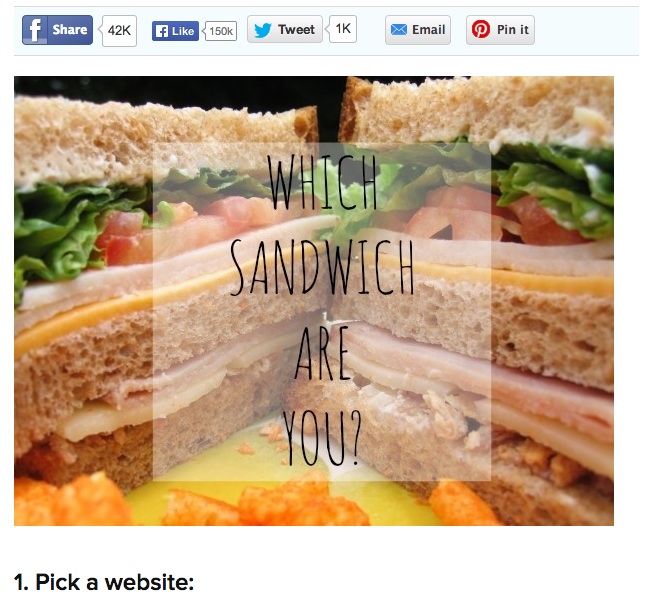
Via Buzzfeed.
A particularly egregious fad has taken over my Facebook feed in the past month, and it’s one that many friends and loved ones have chosen to participate in. It’s the Buzzfeed quiz, and it’s actually not all that unlike any other internet personality quiz, versions of which have made the rounds since the early days of LiveJournal. Taking a Buzzfeed quiz and posting your results is similar to posting your Briggs-Meyers letters (INFJ), which tends to result in a steady stream of comments from friends who now realize to what extent they are (or aren’t at all) like you.
Only the quizzes from Buzzfeed, which I consider the Comic Sans of websites, are different, in a few important—and highly visual—ways. First, they are absurd. (What Sandwich Are You? What Muppet Are You? What “Mean Girls” Character Are You? What Arbitrary Thing Are You? (tagline: “Wanna be a thing? Come on, you know you do. Take this quiz!”) Slate even has a spin-off version of their own: What Buzzfeed Quiz Are You? All of which to say, I find it very hard not to comment on the post that says, “I am a PB&J Sandwich”: “First of all, no, you are not.”
Second, the questions that comprise these quizzes are each lists of objects (or people, characters, &c. that have been converted into objects by virtue of being listed as quiz answers): commercial websites, types of donuts, old TV shows, colors, consumer products, menu items from the Olive Garden, various other pop-cultural phenomena. Each of these lists is depicted as a grid of heinously colorful images, such that the categories the author has created can ossify into classifications. It follows the usual pattern of internet humor—author makes a generalization or assumption based on a combination of observable behavior and preferences, personal taste, and random brainstorming, then posits it as ascertainable and widely known and agreed-upon fact, so that the quiz-taker can easily navigate using nothing but his or her readiness to accept and be amused by this newly named and tacitly confirmed truism. If a reader disagrees with the categories or their components, he or she is simply not “getting” the joke. Because these quizzes are meant to be jokes, yes? They’re lighthearted, I hear you saying. Get a grip, Jenn!

Photo by Brigitte Lacombe, via New York Magazine
But there’s something else about them that bugs me, something that bugs me about every aspect of social media that comes to mind. When did what a person “is” turn into what a person “likes”? Clearly I’m not the first to say this (where is the Marx emoji when you need it?), but it bears consideration in the context of these quizzes. Somewhere along the way, internet and social media users became extremely comfortable categorizing their own personality according to their consumer preferences. It started with the profile that consisted of nothing more than your favorites: books, movies, TV shows. In the early days of Facebook, you could at least type in your own list; now, you’re pretty much required, by way of autofill, to choose from a given set of things. They make the standardization of these lists hard to work around. (Issues of gender and relationship status that arise from this fixity have been documented, widely.)
I read a fantastic piece of Joan Didion’s this week, a review of Woody Allen's movies that came out in 1979 (thanks, Chris Kaiser!). For me, reading it was a welcome deliverance from the endless stream of Woody Allen/Dylan Farrow analysis flooding the internet right now. (An important conversation to have, but there are very few opinions on it I actually want to hear.) Here’s what Didion observed, 35 years ago. In regards to Allen’s infamous list of things that make him want to stay alive, (“Groucho Marx,” “Willie Mays,” Mozart’s “Jupiter” symphony, Flaubert’s A Sentimental Education), she writes, “This list of Woody Allen’s is the ultimate consumer report, and the extent to which it has been quoted approvingly suggests a new class in America, a subworld of people rigid with apprehension that they will die wearing the wrong sneaker, naming the wrong symphony, preferring Madame Bovary.” I can’t help but hear echoes of this all over the social media-verse. I guess all we’re waiting on now is “Which Woody Allen character are you?”


Recent comments
2 years 29 weeks ago
2 years 44 weeks ago
2 years 44 weeks ago
2 years 50 weeks ago
3 years 4 weeks ago
3 years 4 weeks ago
3 years 4 weeks ago
3 years 6 weeks ago
3 years 6 weeks ago
3 years 6 weeks ago